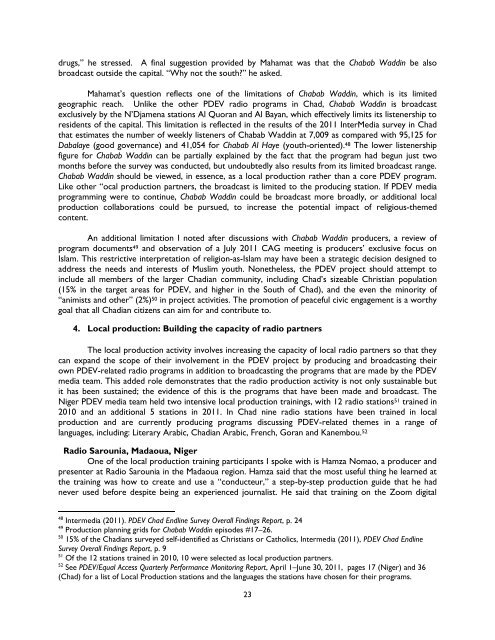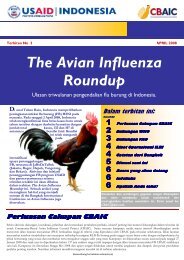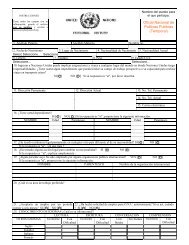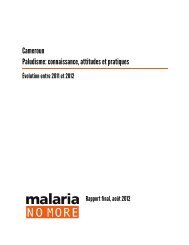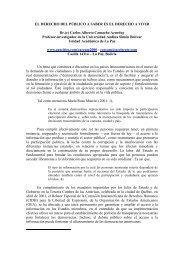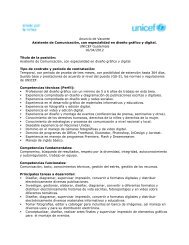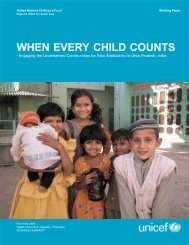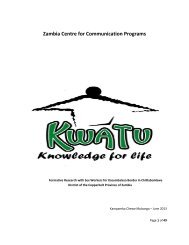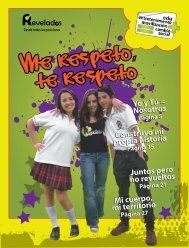to download the 38-page evaluation - The Communication Initiative ...
to download the 38-page evaluation - The Communication Initiative ...
to download the 38-page evaluation - The Communication Initiative ...
You also want an ePaper? Increase the reach of your titles
YUMPU automatically turns print PDFs into web optimized ePapers that Google loves.
drugs,‖ he stressed. A final suggestion provided by Mahamat was that <strong>the</strong> Chabab Waddin be also<br />
broadcast outside <strong>the</strong> capital. ―Why not <strong>the</strong> south?‖ he asked.<br />
Mahamat‘s question reflects one of <strong>the</strong> limitations of Chabab Waddin, which is its limited<br />
geographic reach. Unlike <strong>the</strong> o<strong>the</strong>r PDEV radio programs in Chad, Chabab Waddin is broadcast<br />
exclusively by <strong>the</strong> N‘Djamena stations Al Quoran and Al Bayan, which effectively limits its listenership <strong>to</strong><br />
residents of <strong>the</strong> capital. This limitation is reflected in <strong>the</strong> results of <strong>the</strong> 2011 InterMedia survey in Chad<br />
that estimates <strong>the</strong> number of weekly listeners of Chabab Waddin at 7,009 as compared with 95,125 for<br />
Dabalaye (good governance) and 41,054 for Chabab Al Haye (youth-oriented). 48 <strong>The</strong> lower listenership<br />
figure for Chabab Waddin can be partially explained by <strong>the</strong> fact that <strong>the</strong> program had begun just two<br />
months before <strong>the</strong> survey was conducted, but undoubtedly also results from its limited broadcast range.<br />
Chabab Waddin should be viewed, in essence, as a local production ra<strong>the</strong>r than a core PDEV program.<br />
Like o<strong>the</strong>r ―ocal production partners, <strong>the</strong> broadcast is limited <strong>to</strong> <strong>the</strong> producing station. If PDEV media<br />
programming were <strong>to</strong> continue, Chabab Waddin could be broadcast more broadly, or additional local<br />
production collaborations could be pursued, <strong>to</strong> increase <strong>the</strong> potential impact of religious-<strong>the</strong>med<br />
content.<br />
An additional limitation I noted after discussions with Chabab Waddin producers, a review of<br />
program documents 49 and observation of a July 2011 CAG meeting is producers‘ exclusive focus on<br />
Islam. This restrictive interpretation of religion-as-Islam may have been a strategic decision designed <strong>to</strong><br />
address <strong>the</strong> needs and interests of Muslim youth. None<strong>the</strong>less, <strong>the</strong> PDEV project should attempt <strong>to</strong><br />
include all members of <strong>the</strong> larger Chadian community, including Chad‘s sizeable Christian population<br />
(15% in <strong>the</strong> target areas for PDEV, and higher in <strong>the</strong> South of Chad), and <strong>the</strong> even <strong>the</strong> minority of<br />
―animists and o<strong>the</strong>r‖ (2%) 50 in project activities. <strong>The</strong> promotion of peaceful civic engagement is a worthy<br />
goal that all Chadian citizens can aim for and contribute <strong>to</strong>.<br />
4. Local production: Building <strong>the</strong> capacity of radio partners<br />
<strong>The</strong> local production activity involves increasing <strong>the</strong> capacity of local radio partners so that <strong>the</strong>y<br />
can expand <strong>the</strong> scope of <strong>the</strong>ir involvement in <strong>the</strong> PDEV project by producing and broadcasting <strong>the</strong>ir<br />
own PDEV-related radio programs in addition <strong>to</strong> broadcasting <strong>the</strong> programs that are made by <strong>the</strong> PDEV<br />
media team. This added role demonstrates that <strong>the</strong> radio production activity is not only sustainable but<br />
it has been sustained; <strong>the</strong> evidence of this is <strong>the</strong> programs that have been made and broadcast. <strong>The</strong><br />
Niger PDEV media team held two intensive local production trainings, with 12 radio stations 51 trained in<br />
2010 and an additional 5 stations in 2011. In Chad nine radio stations have been trained in local<br />
production and are currently producing programs discussing PDEV-related <strong>the</strong>mes in a range of<br />
languages, including: Literary Arabic, Chadian Arabic, French, Goran and Kanembou. 52<br />
Radio Sarounia, Madaoua, Niger<br />
One of <strong>the</strong> local production training participants I spoke with is Hamza Nomao, a producer and<br />
presenter at Radio Sarounia in <strong>the</strong> Madaoua region. Hamza said that <strong>the</strong> most useful thing he learned at<br />
<strong>the</strong> training was how <strong>to</strong> create and use a ―conducteur,‖ a step-by-step production guide that he had<br />
never used before despite being an experienced journalist. He said that training on <strong>the</strong> Zoom digital<br />
48<br />
Intermedia (2011). PDEV Chad Endline Survey Overall Findings Report, p. 24<br />
49<br />
Production planning grids for Chabab Waddin episodes #17–26.<br />
50<br />
15% of <strong>the</strong> Chadians surveyed self-identified as Christians or Catholics, Intermedia (2011), PDEV Chad Endline<br />
Survey Overall Findings Report, p. 9<br />
51<br />
Of <strong>the</strong> 12 stations trained in 2010, 10 were selected as local production partners.<br />
52<br />
See PDEV/Equal Access Quarterly Performance Moni<strong>to</strong>ring Report, April 1–June 30, 2011, <strong>page</strong>s 17 (Niger) and 36<br />
(Chad) for a list of Local Production stations and <strong>the</strong> languages <strong>the</strong> stations have chosen for <strong>the</strong>ir programs.<br />
23


